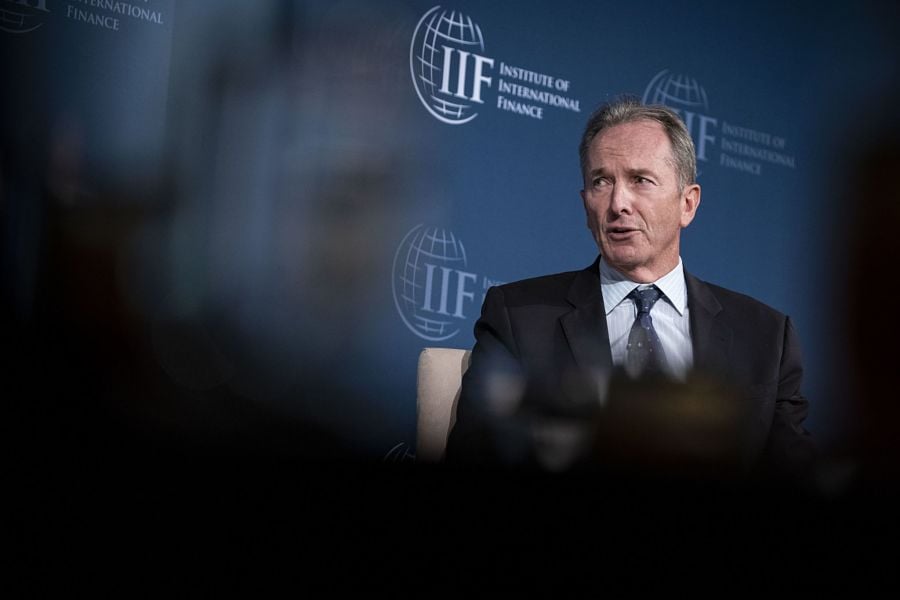

A tense election highlighted by political fractures and social unrest combined with the COVID-19 pandemic that could last well into next year and an economy that’s struggling in many areas should make investors cautious, Morgan Stanley chief executive James Gorman said Monday.
The country is in “a lot of turmoil and uncertainty,” Gorman said during the virtual Securities Industry and Financial Markets Association annual conference. “The prudent investor doesn’t try and get greedy.”
Investors and Morgan Stanley are choosing a “workspace close to shore,” Gorman said. “We’re managing our risks, I think, prudently. Some might be more aggressive. I don’t care. If that means we lose some revenue to them, we would rather be secure.”
He noted the stock market is at record highs and interest rates are at record lows. Technology is growing rapidly while other sectors, such as tourism and hospitality, are faltering, producing a situation in which “there are extremely healthy pockets and there are much unloved pockets of the markets,” Gorman said.
“In this environment, I think, again, the catch word is uncertainty, and in periods of uncertainty, you should be a little cautious,” Gorman said. “That’s certainly how we’re running Morgan Stanley.”
He said wealth management clients are “much more sober through this. I’ve been kind of surprised at how little variation there has been in their activity. People with serious money have been quite prudent through this; they haven’t been swinging for the fences at all.”
Morgan Stanley recently expanded its position in the retail wealth management business by closing its acquisition of ETrade. The deal has given Morgan Stanley a digital platform to complement its full-service advice offering.
Scooping up ETrade gives Morgan Stanley customers greater latitude in choosing how they want investment advice delivered, Gorman said. “If you don’t give them that choice, they will take their money elsewhere,” he said.
Morgan Stanley also is purchasing Eaton Vance, which will augment the asset management side of its business. The firm will generate about half of its revenues on the institutional investment side and about half from asset and retail wealth management, Gorman said.
The firm is seeking “a combination of speed and growth with ballast and steadiness,” Gorman said.
The Wall Street leader touted socially sustainable investing, which has been under regulatory scrutiny. He said there will continue to be strong demand for investing based on environmental, social and governance factors.
“ESG investing is not a fad,” Gorman said. “People are concerned and they want to invest where their heart tells them to invest.”
He also addressed diversity in the financial industry, saying that much work still needs to be done. “We are not where we need to be,” Gorman said. “We’ve done better from a low base.”
Morgan Stanley is establishing an institute on diversity and inclusion to analyze the firm’s efforts in the area, Gorman said. It will be similar to an institute on sustainability it created in 2014.
“We want to move the needle,” said Gorman, who will chair the diversity institute. “We are going to make a difference."

While industry statistics pointing to a succession crisis can cause alarm, advisor-owners should be free to consider a middle path between staying solo and catching the surging wave of M&A.

New joint research by T. Rowe Price, MIT, and Stanford University finds more diverse asset allocations among older participants.

With its asset pipeline bursting past $13 billion, Farther is looking to build more momentum with three new managing directors.

A Department of Labor proposal to scrap a regulatory provision under ERISA could create uncertainty for fiduciaries, the trade association argues.

"We continue to feel confident about our ability to capture 90%," LPL CEO Rich Steinmeier told analysts during the firm's 2nd quarter earnings call.
Orion's Tom Wilson on delivering coordinated, high-touch service in a world where returns alone no longer set you apart.
Barely a decade old, registered index-linked annuities have quickly surged in popularity, thanks to their unique blend of protection and growth potential—an appealing option for investors looking to chart a steadier course through today's choppy market waters, says Myles Lambert, Brighthouse Financial.
